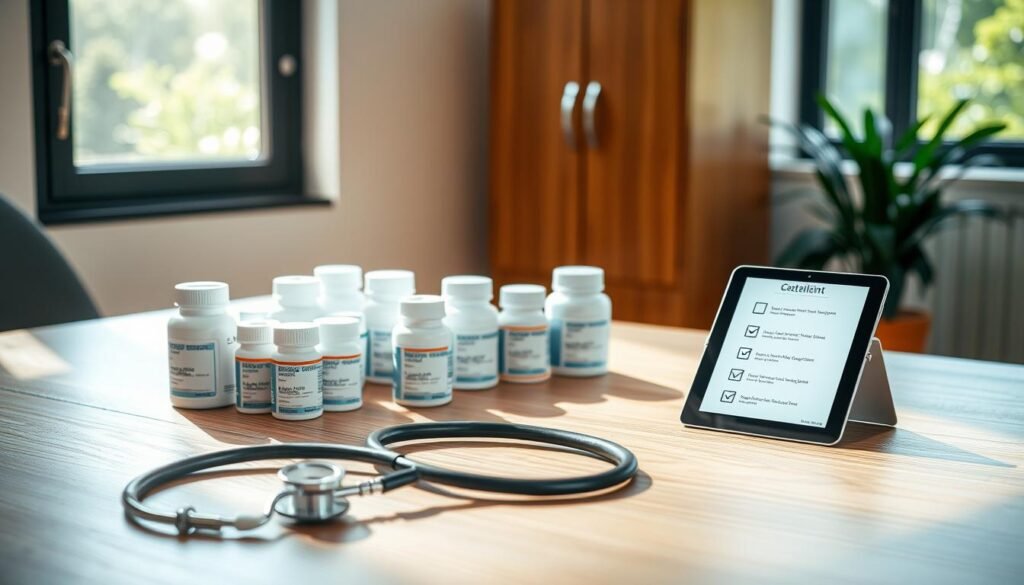Did you know hydroxyzine is more effective at easing anxiety symptoms than a placebo? It’s marketed under the name Vistaril. This antihistamine is often chosen for treating anxiety. But its safety for long-term use raises questions.
For those fighting anxiety, it’s key to understand hydroxyzine’s effects. It’s not habit-forming, which may make it seem like a good option. Still, doctors consider the risks of tolerance and side effects over time. This piece looks into these issues, helping you gauge if hydroxyzine is right for ongoing anxiety relief.
Key Takeaways
- Hydroxyzine (Vistaril) is effective for short-term anxiety treatment but may have limited long-term viability.
- Patients might build tolerance over time, reducing its effectiveness.
- Hydroxyzine is not habit-forming, making it safer than some alternative medications.
- Common side effects include dizziness, dry mouth, and drowsiness.
- Dosage adjustments may be necessary for elderly patients due to increased side effects.
- Proper medical supervision is essential to ensure safe usage.
- Alternative treatments for anxiety could include SSRIs and benzodiazepines.
Understanding Hydroxyzine as an Anxiety Treatment
Hydroxyzine is useful for treating anxiety. It is known for making people feel more relaxed. Although it’s not the main treatment, the FDA has approved it for helping with anxiety. Doctors often prescribe it for other anxiety issues like generalized anxiety disorder (GAD) and panic disorders too.
There are different kinds of Hydroxyzine, such as Hydroxyzine Pamoate and Hydroxyzine HCl. These types meet the needs of various patients. Specific forms include:
| Formulation | Forms Available | Strengths |
|---|---|---|
| Hydroxyzine Pamoate | Capsules | 25 mg, 50 mg, 100 mg |
| Hydroxyzine HCl | Tablets, Syrup, Solution | Tablets: 10 mg, 25 mg, 50 mg; Syrup: 10 mg/5mL; Solution: 25 mg/mL, 50 mg/mL |
| Brand Name | Vistaril® | Capsule: 25 mg, 50 mg |
Hydroxyzine does more than help with anxiety. It can also help with sleep problems, nausea, and allergies. Since it’s not addictive, it’s safer than many anxiety medicines. But, it’s important to use it as your doctor tells you. This ensures it works well and safely.
However, hydroxyzine is not for everyone. Pregnant women in their first trimester shouldn’t take it because it could harm the baby. Older adults should also be careful, as the side effects can be stronger for them. Some common side effects are feeling dizzy, having a dry mouth, and feeling sleepy.
In the end, hydroxyzine is a good choice for those dealing with anxiety without the risk of addiction. When used correctly and under a doctor’s care, it can effectively manage symptoms of anxiety.
How Hydroxyzine Works to Reduce Anxiety
Hydroxyzine is key in mental health management as it targets the body’s histamine receptors. This leads to a calming effect, helping those with anxiety feel relief. By blocking these receptors, hydroxyzine reduces the brain’s emotional response.
Thus, it makes people feel more relaxed. It stands out as a different choice for treating anxiety.
In just 15 to 30 minutes, many start feeling less anxious. Taking about 50 mg daily helps greatly with generalized anxiety disorder (GAD). Hydroxyzine also helps stop panic attacks better than some other medications.
However, we need to be aware of hydroxyzine side effects. They usually include feeling sleepy, dizzy, a dry mouth, and being tired. Though rare, some might have allergic reactions or heart issues, which is critical for those with arrhythmia history.
This shows how vital it is to watch for side effects during treatment. Hydroxyzine plays a big role in treating anxiety, crucial since over 30% of US adults face anxiety disorders. Knowing how hydroxyzine works and its effects is key for treatment and safety. Read more about its mechanism.
Is Hydroxyzine Safe for Long-Term Anxiety Management?
More than 30% of adults in the US face anxiety disorders. Finding the right treatment is crucial. Hydroxyzine is FDA-approved for easing anxiety but is mainly for short-term use. It should not be used for more than four months. Though effective in easing anxiety quickly, the safety of using hydroxyzine long-term is a concern.
Hydroxyzine helps by adjusting serotonin levels, which calms and stabilizes mood. But, it’s not meant for long-term use. Doctors prescribe it temporarily, while starting patients on longer-lasting anti-anxiety meds like SSRIs or SNRIs. Doses for adults can vary, from 50 to 100 mg up to four times a day. Starting doses can be as low as 10 mg.
Hydroxyzine usually doesn’t lead to dependence as some anxiety drugs do. Yet, it can cause drowsiness, dry mouth, dizziness, and headaches. Thus, ongoing checks and close watch are key. This way, any negative effects are handled quickly, ensuring patients get the best care.
Comparing Hydroxyzine to Other Anti-Anxiety Medications
More than 30% of American adults deal with anxiety at some point. This has led to different treatment options, including hydroxyzine and benzodiazepines. When you look at anti-anxiety meds like hydroxyzine and Xanax, you see differences in how safe they are and how well they work. Hydroxyzine is the only antihistamine the FDA approved for anxiety. Meanwhile, Xanax is a benzodiazepine and is seen as a Schedule IV controlled substance. This is because it can be addictive and abused.
Studies show that hydroxyzine and Xanax both work well to ease anxiety symptoms. However, they aren’t usually the first choice for treating generalized anxiety disorder (GAD). Doctors often prefer SSRIs and SNRIs for their long-term benefits in such cases. Hydroxyzine is more for short-term anxiety relief, whereas Xanax is used for up to four months.
Thinking about side effects is key when choosing anxiety treatment. Hydroxyzine can cause headaches, dizziness, and dry mouth. Xanax has a wider range of side effects like fatigue, memory problems, and withdrawal symptoms. Xanax can also lead to dependence, which is risky for people with a past of substance use. Hydroxyzine, on the other hand, doesn’t usually lead to addiction.
Both hydroxyzine and Xanax can only be got through a prescription. Xanax has tighter rules around it because of its abuse potential. When deciding between hydroxyzine or benzodiazepines, talking to a healthcare provider is crucial. They can help choose the best option based on individual health needs and situations.

Potential Side Effects of Hydroxyzine
Hydroxyzine helps manage anxiety among other conditions. However, it can cause several side effects. Knowing about these effects is key for using the medication safely. It’s important for patients to recognize both common and serious side effects. This enables them to act quickly if they face any adverse reactions.
Common Side Effects
Hydroxyzine users often face common side effects. These can include:
- Drowsiness
- Dizziness
- Dry mouth
- Blurred vision
- Headaches
These common side effects usually go away as your body gets used to the drug. Limiting certain activities, like driving, is wise until you know how you react to hydroxyzine. Most of these side effects are mild and don’t last long, fitting the norm for anxiety medications.
Serious Side Effects
There are also rare, serious side effects. These include:
- Severe allergic reactions
- Hallucinations
- Convulsions
- Abnormal heart rhythms, such as increased heart rate or prolonged QT intervals
Spotting serious side effects quickly is crucial. They can signal major risks from hydroxyzine, needing fast medical help. Staying alert and talking to your doctor right away if you have severe symptoms is essential. This helps keep you safe while treating your anxiety.
For more details on side effects, consider looking at reliable sources. A good place to start is this article.
Long-Term Hydroxyzine Use: What the Research Says
Research on long-term use of hydroxyzine for anxiety is complex. It looked at 39 studies and found five that were relevant, involving 884 people. These studies showed hydroxyzine is better than a placebo in treating General Anxiety Disorder (GAD), with a 0.30 odds ratio. However, its effectiveness over a long time is still a question.
Hydroxyzine’s acceptability and tolerability were similar to placebo and other anxiety meds. An odds ratio of 1.00 means users were equally happy with it. This indicates that people can tolerate hydroxyzine well. But, doctors should keep an eye on patients using it long-term.
Hydroxyzine’s performance was compared to other medications like benzodiazepines and buspirone. It worked about the same. But, it was more likely to make people sleepy or drowsy. This shows the importance of evaluating patients carefully. The risk of becoming tolerant to hydroxyzine with long use was also noted.
The FDA has approved hydroxyzine for treating anxiety in adults. But, there’s a high chance of bias in these studies. This makes it hard to trust long-term treatment advice. Keeping a close watch on patients taking hydroxyzine is essential. This ensures their treatment is safe and works well.
Dosage Recommendations for Hydroxyzine
It’s important to know the right amounts of hydroxyzine to use for anxiety. People must follow the dosage their doctors give to stay safe and get the best results. This section talks about how much adults should take and what to keep in mind for children and older people.
Recommended Dosages for Adults
Adults dealing with anxiety typically take 50 to 100 mg of hydroxyzine four times a day. The most they should take in a day is 400 mg. If they have itching, the dose is usually 25 mg three to four times a day. Before a medical procedure, a single dose of 50 to 100 mg may be needed. It’s crucial to stick to these dosages to avoid side effects and ensure the medication works well.
Considerations for Children and the Elderly
How much hydroxyzine a child should take depends on their age and what’s being treated. Children younger than six may take up to 50 mg daily in two to four divided doses. For kids six and older, the dose can be between 50 mg and 100 mg per day, also split into smaller doses. Older adults need to be more careful because they’re more likely to experience side effects. They should start with lower doses of medication. Then, if needed, they can slowly increase, always watching for any problems.
| Age Group | Indication | Dosage |
|---|---|---|
| Adults | Anxiety | 50–100 mg, 4 times a day (max 400 mg/day) |
| Adults | Itching | 25 mg, 3–4 times a day |
| Adults | Sedation (before procedures) | 50–100 mg, once |
| Children | Anxiety, Itching, Sedation | 50 mg total per day, divided |
| Children 6 years+ | Anxiety, Itching, Sedation | 50–100 mg total per day, divided |
| Elderly | General Use | Cautious initiation with potential adjustments |
Hydroxyzine and Special Populations
Hydroxyzine can help with anxiety. But, its safety and effects change among different groups. This is especially true for pregnant women and older adults. Patients and healthcare workers need to understand these differences.
Impacts on Pregnant or Breastfeeding Individuals
Pregnancy and hydroxyzine need careful thought. Early pregnancy use might be risky, research shows. This is because of possible birth defects seen in animal studies. Later in pregnancy, its safety is still being looked into. Doctors must weigh the pros and cons before prescribing it.
When breastfeeding, hydroxyzine can enter the milk. This raises questions about its safety. Therefore, nursing mothers should talk to their doctors. This helps ensure safety for both the mother and baby.
Effects on Elderly Patients
Elderly patients taking hydroxyzine need close watch. They tend to be more sensitive to medicines. This sensitivity increases the chance of unwanted effects like drowsiness and confusion. It’s especially true with hydroxyzine. Starting with a low dose and slowly increasing it is wise.
Regular doctor visits are important to avoid problems. This ensures hydroxyzine helps without causing harm.

Talking to a healthcare provider is key before starting hydroxyzine. For more info on hydroxyzine and special groups, read this detailed guide.
Alternative Treatments for Anxiety Disorders
Today, those dealing with anxiety have many choices besides just meds. One key option is psychotherapy, such as cognitive behavioral therapy (CBT). CBT helps people learn ways to cope. It’s proven to work well for different kinds of anxiety, showing its value as an alternative.
Lifestyle changes also play a big part in managing anxiety holistically. This includes regular workouts, practicing mindfulness, and eating better. Making these changes can greatly improve mental health and lower anxiety symptoms. Combining these methods supports a well-rounded approach to treating anxiety, benefiting both mind and body.
Medications are still important, with SSRIs and SNRIs often suggested first for treating anxiety disorders. But they might not work for everyone. So, looking into other options like buspirone and beta blockers could offer extra help, with fewer side effects.
Natural remedies are another path for dealing with anxiety, offering herbal supplements and relaxation techniques as drug-free choices. Taking different approaches to anxiety treatment lets patients create a care plan that fits their needs better, for a more customized experience.
| Treatment Type | Description | Effectiveness | Side Effects |
|---|---|---|---|
| Cognitive Behavioral Therapy | Behavioral therapy aimed at changing negative thought patterns | High | None |
| SSRIs/SNRIs | Pharmaceuticals used to regulate neurotransmitters | Moderate to High | Fatigue, nausea, sexual dysfunction |
| Buspirone | Mild anxiolytic with lower dependency risk | Moderate | Dizziness, headaches |
| Exercise | Physical activity known to enhance mood and reduce anxiety | High | Fatigue if overexerted |
| Mindfulness | Meditative practices aimed at increasing present-moment awareness | High | None |
Medication Safety and Monitoring
Ensuring patient safety with hydroxyzine needs close watch on how it’s used. Hydroxyzine is often given for anxiety. In 2021, it was the 58th most used drug in the U.S., with over 11 million given out. This shows why we must watch how it works and its side effects carefully.
Talking with doctors about bad reactions is crucial for patients. For example, using hydroxyzine with drugs like opioids needs a careful look at dose levels. Sometimes, doses need to be cut in half to reduce risks. It’s also true for medicines similar to hydroxyzine, as they can raise the chance of certain side effects.
Watching out for drug interactions is key. This is especially true with SSRIs, as mixing them can lead to serotonin syndrome, a very serious issue. Monitoring protocols should also catch QT interval prolongation risks, which can happen with hydroxyzine and similar drugs.
Patients should steer clear of alcohol while on hydroxyzine. Alcohol makes the drug’s sleepy effects stronger, which can be very risky. While caffeine isn’t exactly banned, it’s best to limit it to keep hydroxyzine’s calming benefits.
To sum up, detailed monitoring and following safety guidelines greatly help in using hydroxyzine safely. Talking often with healthcare providers helps patients understand and manage their treatment better.

Conclusion
Hydroxyzine is a good choice for short-term anxiety management. This is backed by solid research. Studies show it’s clearly better than a placebo in treating generalized anxiety disorder. The quick start—usually in 30 minutes to an hour—is a big plus for those who need fast relief. Also, it’s not addictive, which is great when we talk about using it safely over time.
Yet, doctors should keep a close eye on patients using hydroxyzine. This is because of possible side effects like drowsiness. Since everyone’s body reacts differently to medication, pairing hydroxyzine with other treatments might work best. This approach helps maintain mental wellness.
More studies will help us understand hydroxyzine’s role in treating anxiety better. It’s important to focus on how it’s used so patients get care tailored to them. Knowing all the details helps provide the best support for those with chronic anxiety.